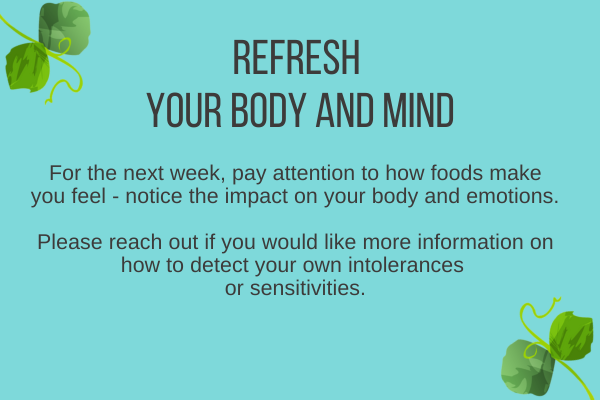If you or someone you love is dealing with a food intolerance, it can be challenging, but with the right approach, you can foster a balanced relationship with food that supports your overall well-being.
Here are my top strategies for dealing with food intolerances:
Focus on What You Can Eat, Not on What You Can’t:
As an example, let’s say you find out that you can’t eat gluten, dairy and eggs. If you’re hearing that for the first time, that can feel like a life sentence! Just walking into a grocery store or explaining to a friend what you can and can’t eat at a dinner party can feel overwhelming.
That said, it’s much easier to say, “My diet is limited right now, but I can eat all fruits, vegetables and meats”.
Imagine the abundance of food available to you, rather than focusing on all the foods you can’t eat. Emphasize whole, minimally processed foods to reduce exposure to potential allergens or irritants commonly found in packaged products.
In general, just eat ‘real’ food!
Read Labels Cautiously:
Of course, you may not want to avoid all packaged products. So learn to read food labels attentively to spot hidden ingredients that may trigger intolerances. Be aware of terms that may indicate the presence of things you can’t eat. And once you find a product you love, stock up on it so that you can access it any time you want to.
Seek Nutrient Alternatives:
Be sure you’re still getting your nutrients. Replace restricted foods with nutrient-dense alternatives to ensure you’re meeting your nutritional needs. Explore a variety of foods to maintain a balanced diet.
And add in supplementation; it’s designed to ‘supplement’ the nutrients you might be missing.
Take a Food Sensitivity Test:
If you sense that certain foods are causing digestive upset, bloating, hives or other symptoms, I offer a simple ‘finger-prick’ test to scientifically check whether a particular food is creating a reaction for you. It is much simpler than an elimination diet as it tests for almost 100 foods.
Supportive Community:
Connect with others who share similar experiences. There are plenty of Facebook groups out there for all types of food intolerances. Support groups or online communities can provide valuable insights, advice and emotional support. You may wander the food isles looking for suitable replacements for your favorite foods and there is likely someone out there that has tried many brands and has found the tastiest one!

As always, please share your experiences, favorite strategies, or any questions. I’d love to hear about your journey with managing food intolerances.
And of course, health coaching and support around these issues is what I do, so please don’t hesitate to reach out to me for a free consultation so that I can help get you on track!

